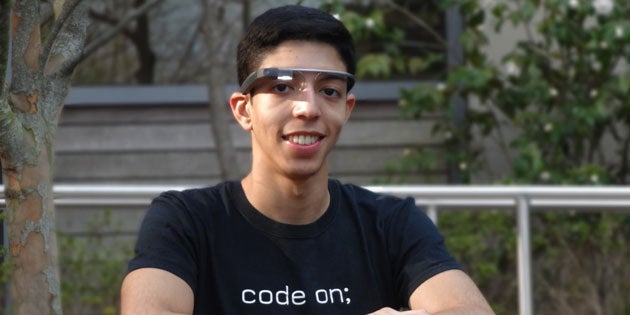Michael Feliciano ’14 didn’t know what to expect when he ventured forth from the College of Charleston in May 2014 to officially start his post-graduation gap year.
He had $10,000 in the bank that he raised through the crowdfunding website Upstart.com. He had a roof over his head at his parent’s house in Columbia, S.C. And he had a shopping list of items he hoped would kick-start his creativity and occupy his time in productive ways.
Beyond those essentials, the computer science graduate knew only that he wanted to spend his 12-month sabbatical advancing his skills as a computer programmer and problem-solver and, hopefully, come up with the next big idea in tech.
So how did it go and what advice does he have for others considering a gap year?
Here are 5 lessons Feliciano took away from his gap year after college:
1. Be Adaptive
Using a chunk of his funding from Upstart, Feliciano plunked down $1,500 to buy Google Glass, the once-hyped head-mounted computing device with a built-in optical display. His plan was to develop applications for the device. But that was before Google announced it was discontinuing its Google Glass developer program.
Though he did generate some traffic on his YouTube channel when he wore his Google Glass to spring commencement and filmed himself receiving his degree (watch the video below), Feliciano says he “didn’t have the next billion dollar idea ready to go when Google shifted.”
So rather than waste more time writing apps for a product with an uncertain future, he quickly turned his attention to other projects.
Another item Feliciano purchased with his Upstart funding was Occulus Rift, a virtual reality headset.
“I was all in the first couple months,” he says. But the deeper he got into programming for the device, the more he realized how different developing virtual worlds is from writing code for mobile applications.
So, like the Google Glass, the Occulus Rift went on a shelf and Feliciano turned his attention to more productive pursuits.
2. Be Disciplined and Self-motivated
When time is plentiful and there’s no boss standing over you, it’s easy to go down time-wasting rabbit holes. To combat this tendency, Feliciano woke every morning with a plan of what he wanted to accomplish that day.
“You have to be goal-oriented and self motivated on a daily basis,” he advises. “Very, very easily you can be non-productive. I don’t even own a television, but I hear that Netflix is pretty compelling.”
3. Keep Learning
Education is a life-long pursuit that doesn’t end the moment you earn a degree. With more time on his hands, Feliciano found himself drawn to a wide array of topics and academic fields that he either hadn’t been interested in or hadn’t had the time to explore while in college.
During his gap year, he devoured audio books, took classes online, studied foreign languages and competed in coding competitions.
As a tech entrepreneur, he’s learned to wear many hats. “You have to be versatile. If you are willing to learn, you will do very well. But if you say something is outside of my current knowledge area and you’re not willing to learn, then I’d say, unfortunately, entrepreneurship is not for you.”
4. Live Frugally and Minimally
As his gap year was winding down this past spring, Feliciano got a call from some friends and former computer science classmates at the College. Griffin Peddicord ’14 and Jacob Tyree ’14 were developing a new app and they wanted Feliciano to join their team.
Because he lived frugally and minimally during his gap year – he saved money and his largest possessions were a bed and computer – Feliciano was able to act quickly on the offer. Within days, he moved back to Charleston to become a co-founder of Dukana, a social shopping platform.
Read more on The College Today about Feliciano’s business partner and alum Griffin Peddicord ’14.
“By staying out of the job market, I was able to respond to opportunities that might not have otherwise found me.”
5. Plan Ahead
With his entrepreneurial venture going well, Feliciano hasn’t had the financial need to dive into a traditional, full-time job – and he may never do so. His gap year has evolved into a gap life.
“I’m actually living really comfortably,” he says. “The thing with entrepreneurship is the second you stop looking for the next opportunity and doing the work, the money stops coming in.”





